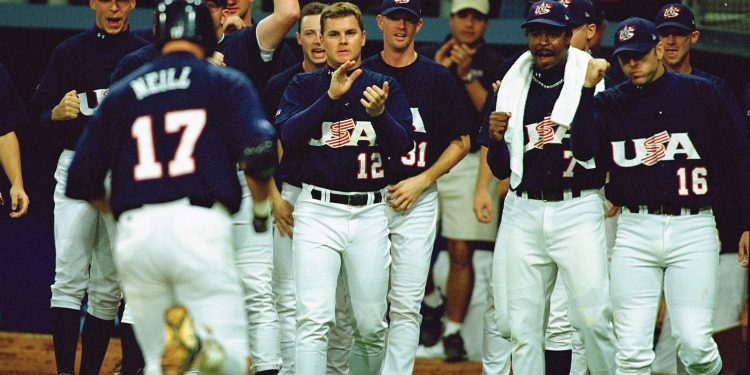Since the first modern Olympics in 1896, 9,842 men and women have competed for the United States in the Summer and Winter Olympics. Owensboro can lay claim to two of them.
From Bluegrass to the Land Down Under
Brad Wilkerson’s story is well known to most Owensboro natives: stand-out baseball player at Apollo High School, three-time All-American at the University of Florida (1996-1998), eight years in the Major Leagues (2001-2008). But, did you know that he is also Owensboro’s only Olympic gold medalist?
After being drafted by the Expos in 1998, Wilkerson’s exemplary play in the Minor Leagues drew the attention of Tommy Lasorda, the Hall-of Fame head coach of the Los Angeles Dodgers. He ultimately chose Wilkerson to be the starting centerfielder for the U.S. team in the 2000 Summer Olympics in Sydney, Australia.
After a 6-1 record in the preliminary round, the U.S. opponent in the gold medal match was Cuba. Having won gold at the two previous Summer Olympics and at the Pan-American Games the year before, Cuba was highly favored to win. “The talent on that team was immense,” Wilkerson recalls. “They beat us in the prelims, but we knew that if we got another shot at them, we would take care of business.”
And they did. After holding Cuba to three hits and no runs, the U.S. beat Cuba 4-0, one of the greatest upsets in Olympic history.
Wilkerson considers it one of his greatest achievements. “You grow up watching the Olympics, thinking, ‘God, it would be so cool to be there,’ he said, “So to actually be there … to achieve Olympic status and to win a gold medal, nobody can ever take that away from you.”
Rockne’s Mule
As we’ve seen, Brad Wilkerson was Owensboro’s first Olympic gold medalist, but he was not Owensboro’s first Olympian. That honor goes to Eugene Oberst.
After graduating from Owensboro High School in 1919, Oberst enrolled at Notre Dame, where, at right tackle, he was one of Knute Rockne’s “Seven Mules,” the offensive linemen who blocked for the famed “Four Horsemen” of the Fighting Irish football team.
Walking by the football field one day during track-and-field practice, an errant javelin nearly speared Oberst. He picked it up and threw it back so far that he was added to the track-and-field team on the spot. He eventually performed well enough in collegiate javelin competitions to earn a spot on the U.S. team for the 1924 Summer Olympics in Paris, France.
On a muddy, rain-soaked field, with a wooden javelin caked in dirt, Oberst threw the javelin 58.35 meters to win the bronze medal. It was the first time the U.S. had ever medaled in the javelin throw.
He came home expecting a hero’s welcome, but greeting him at the train station was only the porter, who asked him matter-of-factly, “Hiya Oberst, been someplace?” Apparently, most of Owensboro did not even know that he had competed.
With the 2016 Summer Olympic and Paralympic Games recently concluded, we would do well to honor the Olympic feats of both Oberst and Wilkerson, so that they may inspire the next generation of Owensboro Olympians.










